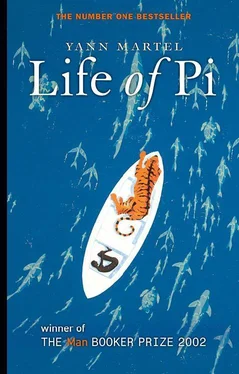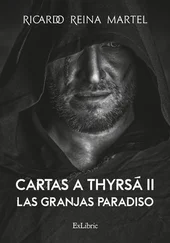Just beyond the ticket booth Father had had painted on a wall in bright red letters the question: DO YOU KNOW WHICH IS THE MOST DANGEROUS ANIMAL IN THE ZOO? An arrow pointed to a small curtain. There were so many eager, curious hands that pulled at the curtain that we had to replace it regularly. Behind it was a mirror.
But I learned at my expense that Father believed there was another animal even more dangerous than us, and one that was extremely common, too, found on every continent, in every habitat: the redoubtable species Animalus anthropomorphicus , the animal as seen through human eyes. We’ve all met one, perhaps even owned one. It is an animal that is “cute”, “friendly”, “loving”, “devoted”, “merry”, “understanding”. These animals lie in ambush in every toy store and children’s zoo. Countless stories are told of them. They are the pendants of those “vicious”, “bloodthirsty”, “depraved” animals that inflame the ire of the maniacs I have just mentioned, who vent their spite on them with walking sticks and umbrellas. In both cases we look at an animal and see a mirror. The obsession with putting ourselves at the centre of everything is the bane not only of theologians but also of zoologists.
I learned the lesson that an animal is an animal, essentially and practically removed from us, twice: once with Father and once with Richard Parker.
It was on a Sunday morning. I was quietly playing on my own. Father called out.
“Children, come here.”
Something was wrong. His tone of voice set off a small alarm bell in my head. I quickly reviewed my conscience. It was clear. Ravi must be in trouble again. I wondered what he had done this time. I walked into the living room. Mother was there. That was unusual. The disciplining of children, like the tending of animals, was generally left to Father. Ravi walked in last, guilt written all over his criminal face.
“Ravi, Piscine, I have a very important lesson for you today.”
“Oh really, is this necessary?” interrupted Mother. Her face was flushed.
I swallowed. If Mother, normally so unruffled, so calm, was worried, even upset, it meant we were in serious trouble. I exchanged glances with Ravi.
“Yes, it is,” said Father, annoyed. “It may very well save their lives.”
Save our lives! It was no longer a small alarm bell that was ringing in my head—they were big bells now, like the ones we heard from Sacred Heart of Jesus Church, not far from the zoo.
“But Piscine? He’s only eight,” Mother insisted.
“He’s the one who worries me the most.”
“I’m innocent!” I burst out. “It’s Ravi’s fault, whatever it is. He did it!”
“What?” said Ravi. “I haven’t done anything wrong.” He gave me the evil eye.
“Shush!” said Father, raising his hand. He was looking at Mother. “Gita, you’ve seen Piscine. He’s at that age when boys run around and poke their noses everywhere.”
Me? A run-arounder? An everywhere-nose-poker? Not so, not so! Defend me, Mother, defend me, I implored in my heart. But she only sighed and nodded, a signal that the terrible business could proceed.
“Come with me,” said Father.
We set out like prisoners off to their execution.
We left the house, went through the gate, entered the zoo. It was early and the zoo hadn’t opened yet to the public. Animal keepers and groundskeepers were going about their work. I noticed Sitaram, who oversaw the orang-utans, my favourite keeper. He paused to watch us go by. We passed birds, bears, apes, monkeys, ungulates, the terrarium house, the rhinos, the elephants, the giraffes.
We came to the big cats, our tigers, lions and leopards. Babu, their keeper, was waiting for us. We went round and down the path, and he unlocked the door to the cat house, which was at the centre of a moated island. We entered. It was a vast and dim cement cavern, circular in shape, warm and humid, and smelling of cat urine. All around were great big cages divided up by thick, green, iron bars. A yellowish light filtered down from the skylights. Through the cage exits we could see the vegetation of the surrounding island, flooded with sunlight. The cages were empty—save one: Mahisha, our Bengal tiger patriarch, a lanky, hulking beast of 550 pounds, had been detained. As soon as we stepped in, he loped up to the bars of his cage and set off a full-throated snarl, ears flat against his skull and round eyes fixed on Babu. The sound was so loud and fierce it seemed to shake the whole cat house. My knees started quaking. I got close to Mother. She was trembling, too. Even Father seemed to pause and steady himself. Only Babu was indifferent to the outburst and to the searing stare that bored into him like a drill. He had a tested trust in iron bars. Mahisha started pacing to and fro against the limits of his cage.
Father turned to us. “What animal is this?” he bellowed above Mahisha’s snarling.
“It’s a tiger,” Ravi and I answered in unison, obediently pointing out the blindingly obvious.
“Are tigers dangerous?”
“Yes, Father, tigers are dangerous.”
“Tigers are very dangerous,” Father shouted. “I want you to understand that you are never—under any circumstances—to touch a tiger, to pet a tiger, to put your hands through the bars of a cage, even to get close to a cage. Is that clear? Ravi?”
Ravi nodded vigorously.
“Piscine?”
I nodded even more vigorously.
He kept his eyes on me.
I nodded so hard I’m surprised my neck didn’t snap and my head fall to the floor.
I would like to say in my own defence that though I may have anthropomorphized the animals till they spoke fluent English, the pheasants complaining in uppity British accents of their tea being cold and the baboons planning their bank robbery getaway in the flat, menacing tones of American gangsters, the fancy was always conscious. I quite deliberately dressed wild animals in tame costumes of my imagination. But I never deluded myself as to the real nature of my playmates. My poking nose had more sense than that. I don’t know where Father got the idea that his youngest son was itching to step into a cage with a ferocious carnivore. But wherever the strange worry came from—and Father was a worrier—he was clearly determined to rid himself of it that very morning.
“I’m going to show you how dangerous tigers are,” he continued. “I want you to remember this lesson for the rest of your lives.”
He turned to Babu and nodded. Babu left. Mahisha’s eyes followed him and did not move from the door he disappeared through. He returned a few seconds later carrying a goat with its legs tied. Mother gripped me from behind. Mahisha’s snarl turned into a growl deep in the throat.
Babu unlocked, opened, entered, closed and locked a cage next to the tiger’s cage. Bars and a trapdoor separated the two. Immediately Mahisha was up against the dividing bars, pawing them. To his growling he now added explosive, arrested woofs . Babu placed the goat on the floor; its flanks were heaving violently, its tongue hung from its mouth, and its eyes were spinning orbs. He untied its legs. The goat got to its feet. Babu exited the cage in the same careful way he had entered it. The cage had two floors, one level with us, the other at the back, higher by about three feet, that led outside to the island. The goat scrambled to this second level. Mahisha, now unconcerned with Babu, paralleled the move in his cage in a fluid, effortless motion. He crouched and lay still, his slowly moving tail the only sign of tension.
Babu stepped up to the trapdoor between the cages and started pulling it open. In anticipation of satisfaction, Mahisha fell silent. I heard two things at that moment: Father saying “Never forget this lesson” as he looked on grimly; and the bleating of the goat. It must have been bleating all along, only we couldn’t hear it before.
Читать дальше












